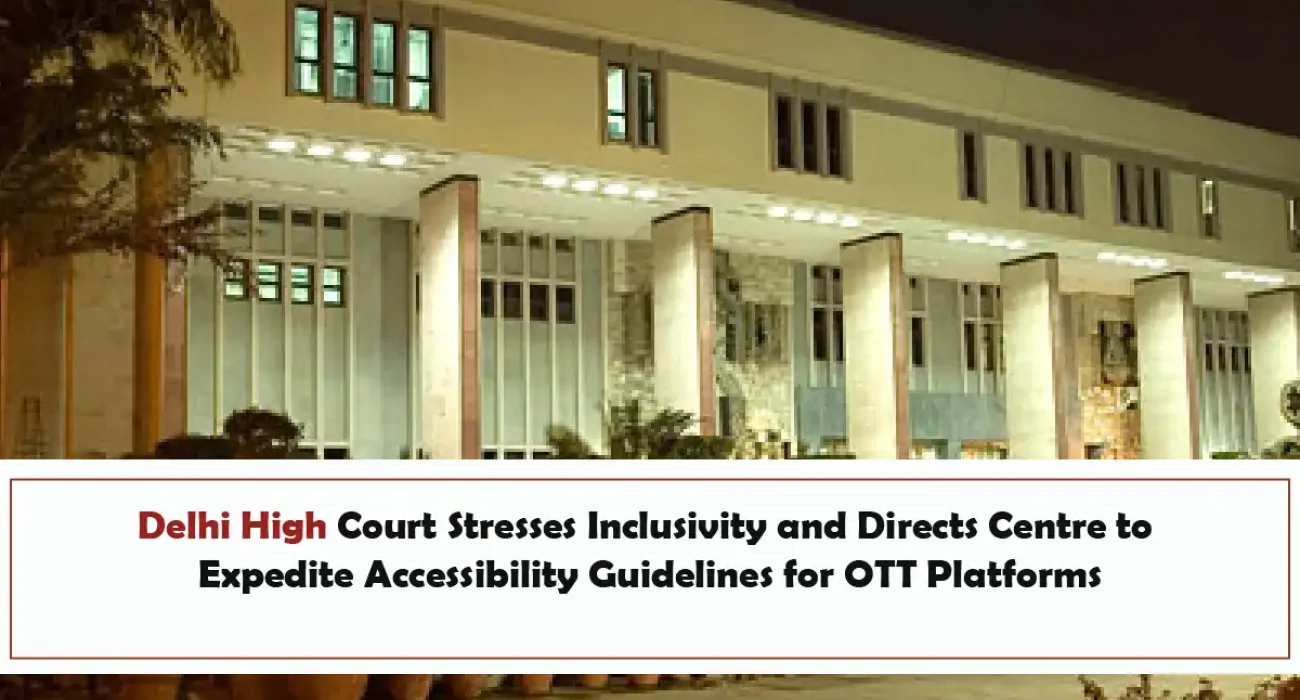

Table of Contents
ToggleThe case originated from a public interest litigation (PIL) filed by Akshat Baldwa, represented by Advocate Rahul Bajaj, before the Delhi High Court. The petition highlighted the absence of key accessibility features such as audio descriptions, same-language captioning, and Indian Sign Language on Over-The-Top (OTT) platforms. These features are crucial for enabling persons with visual and hearing impairments to access and enjoy digital content. The petitioner argued that the lack of such features systematically excludes a significant section of the population and amounts to a violation of their fundamental rights under the Rights of Persons with Disabilities Act, 2016 (RPwD Act). It was also claimed that the inaction of the government and content publishers went against the intent of the Information Technology (Intermediary Guidelines and Digital Media Ethics Code) Rules, 2021.
The petitioner argued that despite legislative mandates under the RPwD Act, there is a visible gap in the implementation of accessibility standards across digital platforms. He contended that visually and hearing-impaired individuals are unable to fully participate in the growing digital entertainment space due to the absence of accessibility features. This lack of inclusive infrastructure, according to the petitioner, infringes upon the right to equality and non-discrimination guaranteed under the RPwD Act and Article 14 of the Constitution. Furthermore, the petitioner demanded that specific and enforceable guidelines be framed and implemented by the Union Government, requiring OTT platforms to incorporate audio descriptions, same-language captions, and Indian Sign Language interpretation in all content made available to the public.
The primary respondents included Maddock Films Private Limited, Netflix India, the Ministry of Information & Broadcasting, and associated stakeholders. Maddock Films stated through their counsel that they had already taken steps to incorporate accessibility features in their movie “Vicky Vidya Ka Viral Video” and that they were committed to extending similar measures to upcoming films like Article 370, The Buckingham Murders, Bhool Bhulaiyaa 3, and Shaitaan. The Ministry of Information & Broadcasting was directed to file a detailed response outlining the steps it had undertaken or planned to undertake toward the issuance of national accessibility standards for digital platforms. Netflix India informed the Court that it would coordinate with the respective film producers to ensure that the necessary accessibility features are embedded in their content. In a separate update, producers of Stree 2 and Auro Mein Kahan Dum Tha confirmed their compliance with the Court’s previous direction to incorporate accessibility features, following which they were allowed to be removed from the list of parties in the case.
Justice Sachin Datta, while hearing the matter, observed that there was an urgent need to bring accessibility in digital content to the forefront of regulatory and technological priorities. The Court acknowledged that even though both the RPwD Act and the IT Rules mandate the inclusion of persons with disabilities in the digital ecosystem, enforcement had been weak and fragmented. The earlier order dated December 19, 2024, passed by Justice Sanjeev Narula, had already laid a framework wherein it was directed that same-language captioning be added to two specific films within eight weeks. The Government was also instructed to file a counter-affidavit detailing its roadmap for developing disabled-friendly OTT accessibility guidelines. The Court emphasized that stakeholders must take affirmative steps to comply with legal obligations under existing statutes, not only as a matter of legal compliance but also as a moral imperative in a digitally inclusive society.
In the latest hearing on May 19, 2025, the Delhi High Court directed the Union Government to expedite the process of formulating and issuing guidelines that mandate accessibility features on OTT platforms for persons with disabilities. The Court acknowledged the efforts of some respondents, including the producers of certain films who had taken steps to ensure compliance. Netflix was granted four weeks to file its detailed response and action plan regarding accessibility integration. Recognizing compliance by the producers of Stree 2 and Auro Mein Kahan Dum Tha, the Court ordered their removal from the list of respondents. The case has now been scheduled for the next hearing on July 17, 2025. The order reinforces the judicial stand that accessibility must be a non-negotiable part of digital content distribution.
Following the Court’s December 2024 order, the Ministry of Information & Broadcasting issued an official advisory on April 2, 2025, addressed to OTT platforms and their self-regulatory bodies. The advisory reiterated the legal obligations of content publishers under the Information Technology (Intermediary Guidelines and Digital Media Ethics Code) Rules, 2021 and the Rights of Persons with Disabilities Act, 2016. It clarified that the IT Rules contain a Code of Ethics, which calls upon publishers to take reasonable efforts to improve accessibility of their content for persons with disabilities. The advisory reminded platforms that they are not only governed by law but are also expected to adhere to ethical broadcasting standards that promote inclusivity.
It further stated that self-regulatory bodies must actively oversee and ensure the compliance of their member platforms with these obligations. The advisory urged full alignment with existing laws and encouraged the implementation of accessible services such as subtitles, captions, and sign language interpretation. It also served as a directive to OTT platforms to take necessary steps immediately, highlighting that inclusivity is both a legal duty and a social responsibility.
Credits: Adv. Deeksha Rai
IAW resources
Browse our help directory